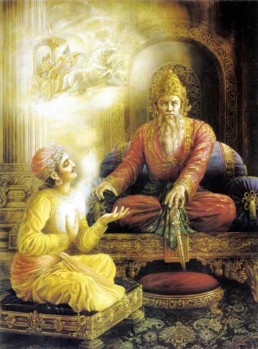Swami Chinmayananda Commentary
All the commanders were no doubt in high tension, and as soon as they heard the marshall’s bugle, individually, each one of them took up his instrument and sounded the battle-cry. Thus, conches and kettle-drums, tabors and trumpets, bugles and cow-horns, all burst forth into a challenging war-call, which Sanjaya, half-heartedly, describes as “tremendous.” Later on, we shall find that when this challenge was replied to by the Pandavas, the sound was described by Sanjaya as “terrific,” “resounding throughout heaven and earth, and rending the hearts of the Kauravas.” Here is another instance to prove that Sanjaya was, evidently, a moral objector to the war-aim of Duryodhana. Therefore, we have in him a most sympathetic reporter of the message of the Lord at the battle-front, as given out in His Song Divine.
Adi Sankara Commentary
Sri Sankaracharya did not comment on this sloka. The commentary starts from 2.10.
The Bhagavad Gita with the commentary of Sri Sankaracharya – Translated by Alladi Mahadeva Sastry
Holy Geeta – Commentary by Swami Chinmayananda
The Bhagavad Gita by Eknath Easwaran – Best selling translation of the Bhagavad Gita
The Bhagavad Gita – Translation and Commentary by Swami Sivananda
Bhagavad Gita – Translation and Commentary by Bhaktivedanta Swami Prabupadha
Srimad Bhagavad Gita Chapter 1 – Verse 13 – 1.13 tatah shankhashcha – All Bhagavad Gita (Geeta) Verses in Sanskrit, English, Transliteration, Word Meaning, Translation, Audio, Shankara Bhashya, Adi Sankaracharya Commentary and Links to Videos by Swami Chinmayananda and others – 1-13

